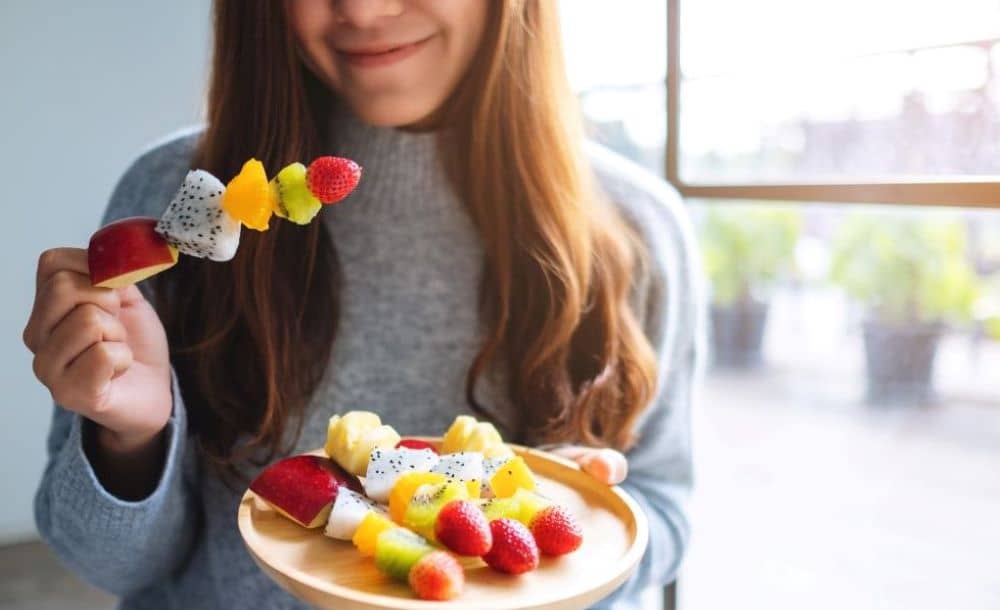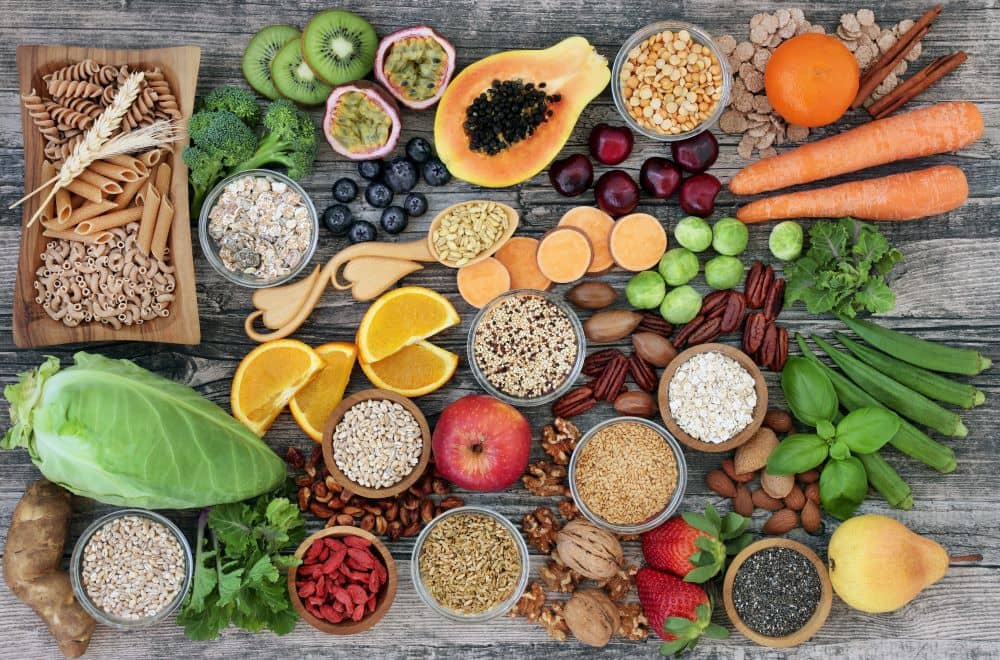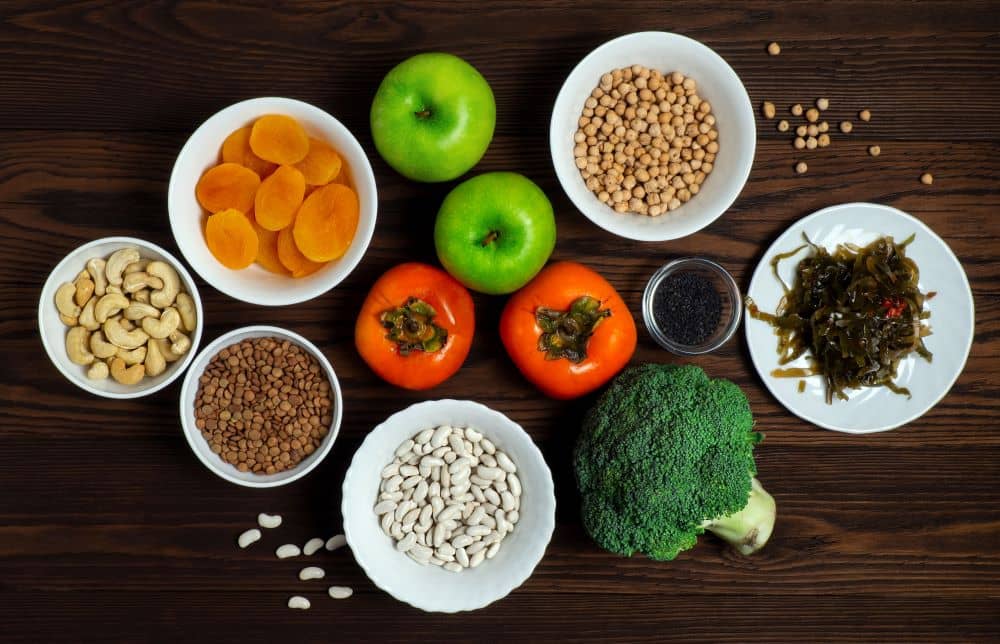10 Easy Tips For A Healthy Vegan Diet

- Written by Melanie Smith
- December 30, 2021
If you are looking to go vegan and eat a diet that is free of meat, dairy, eggs, and animal products but still balanced and full of the nutrients you need, this article is for you.
Here are 10 healthy, easy tips for starting a balanced vegan diet, does not rely on processed vegan alternatives, and is rich in crucial vitamins, protein, and minerals.
10 Easy Tips For A Healthy Vegan Diet
1. Include Plenty of Plant-Based Proteins
One of the common concerns with individuals interested in going vegan is: How will I get enough protein if I’m not eating meat?
However, the number of plant-based sources of protein are abundant, easy to find, and affordable. A few excellent vegan sources of protein include:
- Almonds
- Walnuts
- Pumpkin seeds
- Sunflower seeds
- Tempeh (non-GMO)
- Tofu (non-GMO)
- Edamame (soybeans)
- Chickpeas
- Peanut or almond butter
- Quinoa
- Beans
- Lentils
2. Opt For Whole Grains
Skip the refined grains like white bread and white pasta and opt for whole-grain alternatives instead. Whole grains such as brown rice, quinoa, or oatmeal add extra fibre, B vitamins, and iron to a vegan diet.
The extra fibre will help keep you fuller, longer and the extra nutrients will ensure you are closer to consuming a balanced vegan diet.
3. Enjoy a Variety of Foods
One of the best ways to ensure you are getting the vitamins, minerals, and nutrients you need on a vegan diet is by eating a wide variety of healthy foods.
Try to include as many colourful fruits and vegetables in your daily diet as possible. Think tomatoes and strawberries, oranges and sweet potatoes, yellow bell peppers, leafy greens and broccoli, blueberries, plums, cauliflower — eat all colours of the rainbow!
Need an easy vegan meal that features a lot of variety and will keep you full and energised for hours? Try a whole-grain bowl — simply top brown rice or quinoa with a mix of roasted or sauteed veggies, a sprinkle of nutritional yeast, lentils, and your choice of herbs and spices.
4. Focus Your Meals Around Vegetables
Instead of worrying about what you can’t eat on a vegan diet, think about what you can. By making vegetables the focus of your meals rather than meat, you’ll automatically cut calories, increase your fibre intake, and enjoy a variety of vitamins, minerals, phytonutrients, and antioxidants.
5. Get Enough Vitamin B12
Vitamin B12 is a crucial vitamin that aids in brain function and transforming food into energy. This key vitamin is mostly found in animals foods, such as dairy, eggs, poultry, and meat.
If you are following a vegan diet, be sure to talk with your doctor to ensure you are consuming enough vitamin B12 through supplements, nutritional yeast, or spirulina and other algae as they contain B12. Many people make their B12 in the gut so keeping their levels checked helps them work out if they are one of the people who do.
6. Watch Out For Heavily Processed Vegan Alternatives
Do you see a package labelled “vegan” and automatically assume it’s healthier? This is a common mistake.
Products labelled ‘vegan’ can be full of preservatives, fillers, chemicals, sodium, sugar, palm oil, and other ingredients that will not benefit your waistline or your health.
Instead, stick to nutritious, whole foods that are naturally vegan and feature only a handful of ingredients (that you can pronounce).
Some easy, healthy vegan snack options include whole-grain tortilla chips with guacamole or carrots dipped in hummus. While it is fine to indulge in a vegan treat on occasion, make sure the majority of your diet is based on fruits, vegetables, whole grains, nuts, seeds, and legumes rather than pre-packaged vegan products.
7. Make Sure You Are Still Getting Enough Healthy Fats – Including Omega 3
As with vitamin B12, some nutrients are worth paying extra attention to on a vegan diet. EPA and DHA, omega 3 fatty acids, are important for brain development, eye health, heart health, and so much more.
Omega 3s are mainly found in fatty fish but can also be found in small amounts as ALA from plant-based sources such as:
- Walnuts
- Soy (non-GMO)
- Supplements made from algae
- Coconut cream
- Avocado
- Olive oil
- Flaxseed (must be fresh)
8. Pay Attention To Vitamin D
Along with paying extra attention to omega 3s, it is also important to make sure you are getting enough vitamin D on a vegan diet. Vitamin D is crucial for maintaining strong bones, supporting a healthy mood, supporting the immune system, and a variety of other essential functions in the body.
Some vegan foods such as non-dairy milks or orange juices are fortified with vitamin D. Certain mushrooms also provide a plant-based source of vitamin D.
During summer, vitamin D can be naturally synthesized from the sun. If you choose to take a vitamin D supplement, make sure it is vitamin D3 and not vitamin D2, and double-check that the supplement is suitable for vegans.
9. Get Enough Choline
Choline is another key nutrient to pay attention to on a vegan diet. It is essential for brain and memory function, liver function, cholesterol management, and muscle development.
Egg yolks are the richest source of choline, meaning vegans will have to obtain choline from elsewhere in their diet.
To ensure you get enough choline in your diet as a vegan, eat a diet that includes:
- Seeds
- Grains
- Wheat
- Beans
- Quinoa
- Peanuts
- Green veggies
- Nuts
10. Watch Your Iron Intake
Meat and chicken are some of the best sources of iron, another nutrient that is crucial for vegans to pay close attention to.
To get enough iron on a vegan diet, focus on these foods:
- Legumes
- Leafy greens
- Beans
Iron from these plant-based sources (non-heme iron) is not as easily absorbed as iron from meat sources (heme), making it important to consume iron-rich foods with foods that are also rich in vitamin C. Avoid consuming iron-rich foods at the same time as foods rich in calcium as this can inhibit iron absorption.
Want To Learn More About Eating A Healthy Vegan Diet?
We hope you found our list of tips for eating a healthy vegan diet helpful. You may also want to consider adding a high-quality nootropic as part of a healthy vegan diet.
All of our products are suitable for vegans. If you have questions about any of our products or need help determining which of our supplements would be ideal for your lifestyle and goals, please feel free to reach out to our team.




